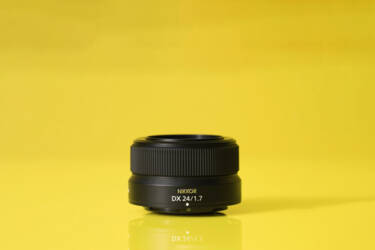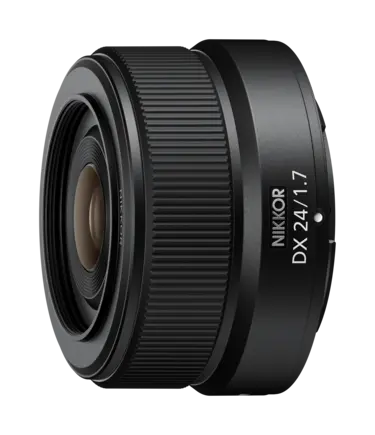Get the most out of the NIKKOR Z DX 24mm f/1.7 with these tips

To celebrate 90 years of NIKKOR, we’re running through the very best in glass. First up: the NIKKOR Z DX 24mm f/1.7. This wide aperture lens is light, creates perfect bokeh and is the perfect first prime to own
The NIKKOR Z DX 24mm f/1.7 is the first fixed focal length ‘prime’ lens for the Nikon Z DX range of cameras (the Nikon Z 30, Z 50 and Z fc). Here’s how to make the most of it.
1. Make it your ‘always on’ lens
A DX 24mm is what we call a ‘classic’ focal length, as the DX cameras have a smaller sensor than full-frame cameras, making this prime an equivalent of 36mm lens (and therefore entering the ‘standard’ focal length range). Remember:
- 12-24mm = ultra-wide
- 24-35mm = wide-angle
- 35-70mm = ‘classic’ focal length
- 70-300mm = telephoto
- 300mm onwards = super-telephoto
This means that the lens will take images with a field of view that looks natural; not an ultra-wide panorama or a tight close-up of something far away. This makes it perfect for a wide variety of styles, from portraits to landscapes and vibrant street scenes. With a total weight of 135g, this is an effortless, lightweight lens you can keep always on your camera.
The f/1.7 is the maximum aperture and how much light the lens lets in. Larger apertures have smaller numbers so f/1.7 means a LOT of light getting into the sensor, especially in low-light scenarios and is fantastic for capturing action with high shutter speeds. Plus, wide aperture allows for greater background blur, so your images and videos will take on a real ‘pro’ look.
Read more: Understanding focal length
What’s in our kitbag?
2. Zoom with your feet
If you purchased your Nikon DX camera with a kit lens, you would have a zoom lens where you can move closer or further away to your subject just using the lens. Prime lenses such as the NIKKOR Z DX 24mm f/1.7 don’t zoom, so to get closer you must move yourself and ‘zoom with your feet’. Moving yourself and the camera to reframe shots is a real eye-opener by making you take time between shots to really concentrate on composition.
Read more: Inside the numbers of the new NIKKOR Z DX 24mm f/1.7
3. Take a video from different angles
The focal length of the NIKKOR Z DX 24mm f/1.7 (35mm FX equivalent) is close to one that is often used by filmmakers to create a natural looking, human’s-eye view of the world, but with a little extra width to the scene. From filming an entire scene to close-up details, using the same lens and focal length for the final product allows for a consistent look and feel.
4. Experiment with bokeh
Bokeh is a Japanese word that describes the quality of great background blur in a photo or video. Bokeh is all about the depth of field of an image. When you capture an image, the depth of field is the certain distance from the camera where everything is in focus.
The large aperture of the NIKKOR Z DX 24mm f/1.7 gives you bokeh in spades. Try taking a portrait outside where there’s a busy background, and with the aperture open all the way you’ll see how it separates the sharp subject and makes the background go creamy and blurry. Bokeh can be used in a variety of creative ways. For bokeh ‘circles,’ increase the distance between your subject and background, photograph with a wide aperture (the lower the f-stop the wider the aperture) and use Manual mode or Aperture Priority to focus. Bokeh works best with dappled light behind your subject – try it out with fairy lights next.
Read more: What is bokeh (and how should I use it?)
5. Change your viewpoint
With a minimum focus distance of just 18cm you can create fantastic close ups with the NIKKOR Z DX 24mm f/1.7. Your subject will really pop in the frame, perfect for things like plates of food or details in a street scene. Try changing the angle you approach the subject from. Getting down low or finding a high point can really have an enormous impact on the end results.
With its compact form and light weight (it’s only 135g), the NIKKOR Z DX 24mm f/1.7, attached to a Nikon DX camera, creates a great package to carry around all day, so you’ll never miss an opportunity when you see one.
The key stats: NIKKOR Z DX 24mm f/1.7
Type: Nikon Z mount
Format: DX
Focal length: 24mm
Maximum aperture: f/1.7
Minimum aperture: f/11
No. of diaphragm blades: 7 rounded diaphragms
Minimum focus distance: 0.18m
Weight: 135g approx.
Want to see it in action? Check out our 90-Second NIKKOR video below.

90-Second NIKKOR: NIKKOR Z DX 24mm f/1.7 in action
Click the button to play
Celebrating 90 years of NIKKOR
Introducing a new video series from Nikon Europe. In each episode, we’ll take a NIKKOR Z mirrorless lens and tell you everything you need to know in 90 seconds
Discover the NIKKOR Z DX 24mm f/1.7

Unlock greater creativity






